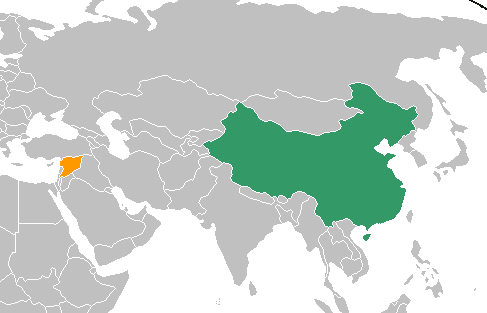Author: Alex Gorka, Defense and Diplomatic Analyst
Source: Strategic Culture Foundation (Link: https://www.strategic-culture.org/news/2017/12/02/analysis-aims-implications-china-military-involvement-syria.html)
China is deploying troops to train, advice and assist in Syria. The decision comes after Syrian Presidential Advisor Bouthaina Shaaban met Chinese Foreign Minister Wang Yi on Nov.24. Islamic militants from East Turkestan (China’s Xinjiang Uyghur Autonomous Region) have shown up in increasing numbers in Syria’s north recently. The Syrian government claims that some 5,000 fighters of Uyghur origin have arrived in Syria, illegally passing through Southeast Asia and Turkey. The Turkistan Islamic Party (TIP) of Uyghur jihadists is affiliated with al-Qaeda. Chinese jihadists are fighting alongside the Al-Qaeda-linked Hay’at Tahrir Al-Sham terrorist group. They call for separation of Xinjiang from China to create an independent state of Eastern Turkestan.
The Chinese units, known as the “Siberian Tigers” and the “Night Tigers”, will be deployed to Syria soon. The 2015 antiterrorism law allows sending Chinese security forces abroad for counterterrorism missions. In March 2016, President of the People’s Republic of China Xi Jinping established a new position — a special envoy for Syria. An experienced diplomat, former ambassador of China to Iran, Ethiopia and the African Union, Xie Xiaoyan was appointed to the new post.
China sent 300 military advisers to Damascus in April 2016 with the stated aim of providing medical and engineering training for the Syrian military. In August 2016, Rear Admiral Guan Youfei, director of the Office for International Military Cooperation of China’s Central Military Commission, met Fahad Jassim al-Freij, Syria’s Defense Minister, in Damascus. During the visit, he signed memorandums of understanding involving joint anti-terror operations including mechanisms to track captured Uighur fighters in Syrian prisons. Over the course of last year, the Syrian military also hosted several Chinese military delegations as China stepped up its aid to Syria.
Asked about the upcoming deployment at a press conference, Chinese Foreign Ministry spokesperson Geng Shuang said, “The world cannot achieve peace without a peaceful Middle East. And the region is at a crucial stage – from counter-terrorism to peace, and from economic restructuring to social changes… As a permanent member of the UN Security Council, China has always paid attention to the peace, stability, and development of the Middle East”. Special Envoy of the Chinese government on the Syrian issue Xie Xiaoyan is attending a new round of peace talks in Geneva.
Chinese economic interests in Syria date back to 2004 with the linking up of key strategic areas around Syria and Lebanon to its One Belt and One Road project (OBOR). Beijing is interested in an end to the Syrian civil war, which would provide much needed stability for expanding China’s regional trade and investment ties outlined in the OBOR initiative. Syria is located in the proximity of this corridor, which, according to the plans, is to become a center for the integration of the vast region, including the Middle East, the Caucasus, Central Asia, Russia and Northern Europe, with India joining the project. This March, President Bashar al-Assad confirmed the visiting trade delegations and expanding academic links to China in an interview to a Chinese media company.
Chinese business delegations have been very proactive in seeking out Syrian government tenders and areas not just of reconstruction, but also bilateral trade deals. China and Russia have supported Syria’s government in the United Nations. Despite the war, China National Petroleum Corporation still holds shares in two of Syria’s largest oil producers: Syrian Petroleum Company and Al-Furat Petroleum Company, while Sinochem also holds substantial shares in various Syrian oil fields. In December 2015, a big deal was signed between the Syrian government and Chinese telecommunications giant Huawei to rebuild Syria’s telecom infrastructure as part of OBOR.
A Chinese delegation was reported to have attended the first International Trade Fair in Damascus since the beginning of the conflict in 2011; Chinese authorities pledged $2 billion dollars in aid towards Syrian reconstruction; in Lebanon, a growing number of Chinese business delegations and project investments are linked to Syria; additionally, the Chinese Ministry of Civil Affairs approved the first aid and early recovery projects for the war-torn country..
China can become a very important player in Syria. Post-war reconstruction is what Syria needs and China is in a position to significantly contribute. As a permanent Security Council member, its role in the peace settlement is of great importance. China’s participation makes the peace process a real international endeavor with wide representation to diminish the role of the West.
The conflict has slowed down, with reconstruction coming to the fore. The role of China is likely to grow in importance due to its special position as the ally of Syrian government endowed with vast economic resources. Syrian President Bashar Assad said in March that when it comes to the rebuilding of Syria after the war is over, Iran, Russia, and China will be given priority.
It’s worth noting that China and Russia are prominent members of what is called the Shanghai Cooperation Organization (SCO). Iran has an observer status and wants to become a member. The aspiration is backed by Russia and China. With international sanctions lifted, the prospect is real. The SCO brings together 17 countries in all, which are either prominent members, or partners, and also includes Turkey, Iran, India, Pakistan and countries in Central Asia. It’s a large organization and a counter-terrorism entity outside the US influence. Russia, China, and Iran joining efforts to solve Syria’s conflict reflects the fact that the SCO is becoming a serious counterweight to the West, and is increasing its presence and influence in the Middle East.
